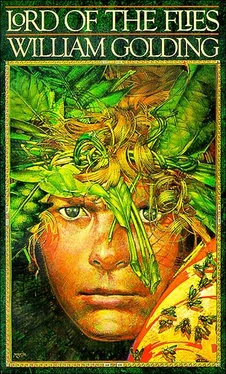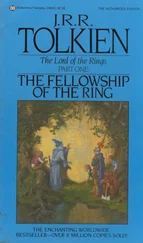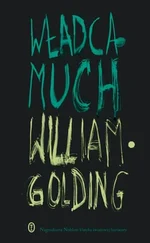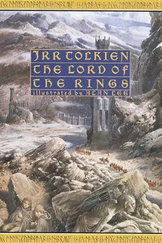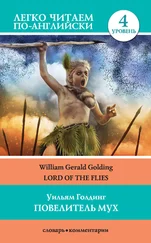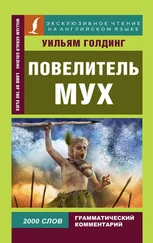William Golding - Lord of the Flies
Здесь есть возможность читать онлайн «William Golding - Lord of the Flies» весь текст электронной книги совершенно бесплатно (целиком полную версию без сокращений). В некоторых случаях можно слушать аудио, скачать через торрент в формате fb2 и присутствует краткое содержание. Год выпуска: 1959, ISBN: 1959, Издательство: Perigee Trade, Жанр: Классическая проза, на английском языке. Описание произведения, (предисловие) а так же отзывы посетителей доступны на портале библиотеки ЛибКат.
- Название:Lord of the Flies
- Автор:
- Издательство:Perigee Trade
- Жанр:
- Год:1959
- ISBN:0399501487
- Рейтинг книги:4.5 / 5. Голосов: 2
-
Избранное:Добавить в избранное
- Отзывы:
-
Ваша оценка:
- 100
- 1
- 2
- 3
- 4
- 5
Lord of the Flies: краткое содержание, описание и аннотация
Предлагаем к чтению аннотацию, описание, краткое содержание или предисловие (зависит от того, что написал сам автор книги «Lord of the Flies»). Если вы не нашли необходимую информацию о книге — напишите в комментариях, мы постараемся отыскать её.
Lord of the Flies — читать онлайн бесплатно полную книгу (весь текст) целиком
Ниже представлен текст книги, разбитый по страницам. Система сохранения места последней прочитанной страницы, позволяет с удобством читать онлайн бесплатно книгу «Lord of the Flies», без необходимости каждый раз заново искать на чём Вы остановились. Поставьте закладку, и сможете в любой момент перейти на страницу, на которой закончили чтение.
Интервал:
Закладка:
Lord of the Flies
by William Golding
For my mother and father
Acknowledgments
A casebook edition of any work of literature is necessarily the result of work and good will by numerous people. We are deeply indebted to the writers who contributed the original materials contained in this volume.
We also wish to thank the authors, editors, and publishers who so kindly granted permissions for use of the previously published materials collected in this volume. Full acknowledgment for their valuable aid is printed in the headnote for each of the articles as well as original sources of publication.
The editors gratefully acknowledge the special courtesies of William Golding, J. T. C. Golding, Frank Kermode, Donald R. Spangler, Bruce P. Woodford, A. C. Willers and James Keating. The Introduction to this book originally appeared in the Arizona Quarterly. It is reprinted here (revised) by permission of the editor, Albert F. Gegenheimer.
For her expert aid in preparing the manuscript, our thanks to Mrs. Paul V. Anderson, and our special gratitude to Miss Helen Davidson, who not only performed routine secretarial duties but offered advice and kept spirits buoyant with her penetrating wit.
J.R.B.
A.P.Z., Jr.
Foreword
It is most astonishing and lamentable that a book as widely read and frequently used in the classroom as William Gelding’s Lord of the Flies has received so little analytical attention from the critics. True, it has not been neglected; this volume attests to that. But despite the profusion of essays by a number of well-known and worthy critics, few close analyses of Golding’s technique can be found among them, few explications of the workings of the novel will be discovered.
Indeed, despite a running controversy over the meaning of the novel, critical articles fall largely into a pattern of plot summary and applause for the arrangement of the novel’s materials followed by observations on Golding’s view of human nature, often embellished with the critic’s response to that view.
There are exceptions—they will be found among the essays in this book—like Claire Rosenfield’s psychological study of meaning, Carl Niemeyer’s comparative study of the novel and its antipathetic predecessor The Coral Island, Donald R. Spangler’s penetrating study of the function of Simon, and William Mueller’s discussion of the use of the various hunts.
Further explorations are needed in many areas, however, among them a careful scrutiny of the opening descriptions of Ralph and Jack in Chapter One. It is useful, but perhaps not very subtle, to point out that the former is immediately declared the “fair boy,” that he, like the angel Gabriel, sounds a horn that announces good news—that of survival—that Jack with his angular frame, black cloak and cap, and red hair is Lucifer-like.
More Biblical parallels must be developed—the paradisiacal setting, the symbolic nakedness or near nakedness of all the boys except Jack and his followers—but most especially needed is a study that explains items that do not comply with the original Biblical pattern but that perhaps serve as tip-offs to the theme and the ironies that Golding employs without fully delineating until the last page, for instance the “response” of the paradise to the boys—first from the heat, then a bird with an echoed “witch-like cry,” then the entangling creepers (more like the Eden of Milton than Genesis)—together with the important information that Ralph, not Jack, has a snake-clasp belt, that Jack wears a golden badge. We have implications very early that Golding’s view is not simple, traditionally Christian, or predictable in spite of the title, that it is a complex rebuttal to the ever-present faith in man’s potential for regeneration and redemption. Here is a fruitful area of research: do all these elements of the novel, some seemingly inconsistent, even extraneous, operate in unified support of theme?
Symbolism is one of the most puzzling aspects of this book. The names of the four major characters are a perplexing illustration. Simon, the mystic of the group, has a name clearly linked with an Apostle of Christ, the one, strange to say, who denied Him three times. (Simon does deny the objective existence of the beast, but is this a parallel?) Jack also has such a name, since his first name is a nickname for John, the announcer of Christ, also a follower of Christ, arid his last name is Merridew, an echo at least of Mary. Ralph’s name, oddly enough, is unrelated to the New Testament and in fact is said to be akin to the Anglo-Saxon Raedwulf, “wolf-council.” Piggy’s nickname appears even more incongruous because it is Simon rather than Piggy who is slain as a substitute pig. The only instance in which a name seems incontestably appropriate is that of Roger, where etymology directs us to the Anglo-Saxon Hrothgar, “spear-fame.”
In The Coral Island the three protagonists are named Jack, Ralph, and Peterkin Gay. Golding claims that he changed the latter name to Simon to emphasize his priestly qualities—implying some intention on his part to make at least one name symbolic—while another critic insists that Peterkin is altered not to Simon but to Piggy. But that is beside the point. The central question is, “To what extent do the names function symbolically?” Do we just select Simon and Roger and, because inconvenient, forget the others? Or is there another more subtle solution?
We are also mystified by the relationship between Lord of the Flies and The Coral Island. Before undertaking a study of Golding’s book, must one study Ballantyne’s? To what degree do details in the former depend upon the latter, and, more confusing, to what degree do both books contain the same details because of similarity of setting?
No one has produced a full-scale synthesis of the symbols of the novel either, nor has anyone prepared a fully adequate study of characterization. Ralph himself is an enigma. Does he represent the idealist and Piggy the pragmatist? Or the reverse? Why are Piggy and Jack foes from the start, but Ralph and Jack friends for a considerable length of time? Is it important that Ralph disdains Piggy for so long? Why does Ralph the leader have such difficulties controlling the littluns even though they instantly recognize him as chief rather than Jack? Why doesn’t Ralph establish a closer bond with Simon? Why does Golding—have Ralph enjoy drawing blood? As one examines the novel closely, he may find himself confronted with a highly ambiguous protagonist, and for what purpose? Do these complications help or hinder the operation of the novel? These are vital matters in evaluating it.
One could add to this list of needed studies indefinitely: a detailed look at the use of war and fighting (they are important from the first page to the last), a discussion of the relationship of nature descriptions and events, a look at the historical predecessors of the mountain, and how they bear on the novel (Calvary, Sinai, Ararat, Olympus, to name a few possibilities), the cause of the evil (Is it really “original sin”?), and so on.
Yet in spite of the gaps in the criticism, some commendable studies have been undertaken, and we have tried to assemble the most useful of them in this book. Supplementing them are two interviews with Golding in which he discusses both his own conception of the novel and related matters.
Through our arrangement of and notes to the articles, we have tried to reflect the intricate texture of the novel as illustrated by the critics and to point up areas of perplexity and disagreement. The bibliography at the close of the volume indicates possibilities for further reading and study.
Arthur P. Ziegler, Jr.
Читать дальшеИнтервал:
Закладка:
Похожие книги на «Lord of the Flies»
Представляем Вашему вниманию похожие книги на «Lord of the Flies» списком для выбора. Мы отобрали схожую по названию и смыслу литературу в надежде предоставить читателям больше вариантов отыскать новые, интересные, ещё непрочитанные произведения.
Обсуждение, отзывы о книге «Lord of the Flies» и просто собственные мнения читателей. Оставьте ваши комментарии, напишите, что Вы думаете о произведении, его смысле или главных героях. Укажите что конкретно понравилось, а что нет, и почему Вы так считаете.
